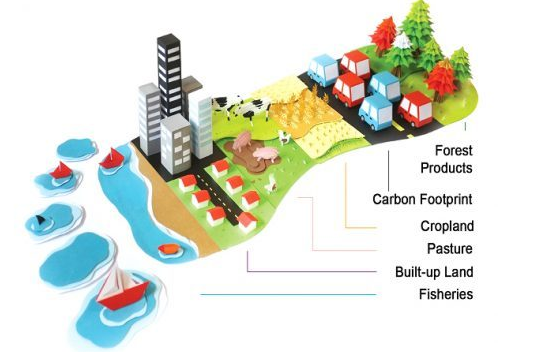In this article, let me start with the concept of Ecology. Simply to define, ‘Ecology is the study of various living organisms and how they interact with the environment around them. The study of the different types of interactions do involve answers to questions as to How do organisms interact with the living and nonliving factors like air, water etc around them? What do organisms need to survive and thrive in the environments in which they live? For answer to all such questions, study of all forms of life and the ecosystems throughout the world in which they live is necessary. It is here also worthwhile to mention that an ecosystem is a geographic area where plants, animals, and other organisms, as well as weather and landscape, work together to form a bubble of life.
Ecosystems contain biotic or living, parts, as well as abiotic factors, or nonliving parts. Biotic factors include plants, animals, and other organisms whereas abiotic comprise of air, water, rainfall etc. As a separate branch of Biology, Ecology first began gaining popularity in the 1960s, when environmental issues were rising to the forefront of public awareness. Around this time, European and American scientists began studying how plants functioned and their effects on the habitats around them. Eventually, this led to the study of how animals interact with plants, other animals, and shaped the ecosystems in which they lived.
Over the years, changes have been observed in various ecosystems all across the globe. Some of these changes have become extreme and are now irreversible. Changes in ecosystems have been due to a host of factors including diseases among the organisms living in the area, increase in temperature and increased anthropogenic activities.Most of the changes as a result of anthropogenic activities have lead to global rise in average temperatures leading to climate change. Climate change has already altered various ecosystems and threatened survival of many plant and animal species. All this ultimately has an adverse impact on the environment and the planet on which we live; environment today has become the major focus of various government programmes and policies.
Human activity plays an important role in degrading as well as restoring the health of ecosystems all around the world. Various type of pollution emitted from fossil fuels or factories have already contaminated our food, water and soil. Water bodies have become toxic, soil has lost its capacity for growing of crops and air has become unfit for breathing. The contamination of food supply for a species potentially changes the whole course of an entire food web. Clearing land by cutting trees has resulted in biodiversity loss. It is wrong to say that we can go on indefinitely with our unsustainable practices. This is possible only in the short term. Only for a brief period can we cut trees faster than they mature, harvest more fish than the oceans can replenish, or emit more carbon into the atmosphere than the forests and oceans can absorb.
The consequences of this overshoot are already clear and louder as our ecological footprints have exceeded the bio-capacity. Our ecological footprints speak in volumes about the excess we are doing with our planet and its natural resources. An ecological footprint refers to the amount of environmental resources necessary to produce the goods and services that support an individual’s lifestyle, a nation’s prosperity, or the economic activity of humanity as a whole. The model is a means of comparing lifestyles, per capita consumption, and population numbers, and checking these against bio-capacity. Bio-capacity on the other hand refers to the capacity of a given biologically productive area to generate an on-going supply of renewable resources and to absorb its spill over wastes. Both bio-capacity and ecological footprint are expressed in a common unit called a global hectare (g ha).
In 2012, the Earth’s total bio-capacity was 12.2 billion g ha, or 1.7 g ha per person, while humanity’s Ecological Footprint was 20.1 billion g ha, or 2.8 g ha per person. The ecological footprint is unequally distributed, with residents of high-income countries placing a disproportionate pressure on nature as they use more than their fair share of the Earth’s resources. At the other end of the scale, people in some of the world’s lowest-income countries struggle to meet basic needs. The various ecological footprints include transportation, energy consumption, agriculture and livestock production, carbon emissions and waste generation· Therefore, electricity consumption, oil consumption and water consumption are all factors that contribute to ecological footprint size. For humanity, to survive on the planet, it is necessary that its ecological footprint size be smaller than the planet’s bio-capacity.
A country that consumes more than 1.73 g ha per person has a resource demand that is not sustainable world-wide if every country were to exceed that consumption level simultaneously. Countries with a footprint below 1.73 g ha per person might not be sustainable: the quality of the footprint may still lead to net long-term ecological destruction. If a country does not have enough ecological resources within its own territory to cover its population’s footprint, then it runs an ecological deficit and the country is termed an ecological debtor. Otherwise, it has an ecological reserve and it is called a creditor. An ecological deficit occurs when the footprint of a population exceeds the bio-capacity of the area available to that population. Conversely, an ecological reserve exists when the bio-capacity of a region exceeds its population’s footprint. Countries with ecological deficits consume more than the ecosystems within their borders can provide. With a per person footprint of 0.75 global hectares and per person bio-capacity of 0.4 global hectares, India is running an ecological deficit of approximately 100 percent.
The ecological footprint is a method promoted by the Global Footprint Network to measure human demand on natural capital, i.e. the quantity of nature it takes to support people and their economies. It tracks this demand through an ecological accounting system. In short, it is a measure of human impact on the environment and whether that impact is sustainable. The footprint can be a useful tool to educate people about overconsumption and overpopulation, with the aim of altering personal behavior or public policies.
Ecological footprints may be used to argue that current lifestyles and human numbers are not sustainable. Country-by-country comparisons show the inequalities of resource use on this planet. The carbon footprint is a component of the total ecological footprint. The Ecological Footprint adds up all the ecological services people demand that compete for space. It includes the biologically productive area (or bio-capacity) needed for crops, grazing land, built-up areas, fishing grounds and forest products. It also includes the area of forest needed to absorb carbon dioxide emissions that cannot be absorbed by the ocean. Carbon from burning fossil fuels has been the dominant component of humanity’s Ecological Footprint for more than half a century and its share continues to grow.
At a global scale, footprint assessments show how big humanity’s demand is compared to what this planet can renew. Global Footprint Network estimates that, as of 2019, humanity has been using natural capital 75% faster than Earth can renew it, which they describe as meaning humanity’s ecological footprint corresponds to 1.75 planet Earths. This is called ecological overshoot. Ecological footprint analysis is widely used around the world in support of sustainability assessments. It enables people to measure and manage the use of resources throughout the economy and explore the sustainability of individual lifestyles, goods and services, organizations, industry sectors, neighborhoods, cities, regions, and nations.
Corrective action needs to be undertaken on priority basis in order to avoid reaching a point of no return. Our micro level efforts at individual household level can make a big difference at macro level. Everyone must have to start from its own. The words of Father of Nation, Late Mohan Das Karam Chand Gandhi, ‘Be the change you want to see in the world’ seem to be the most relevant in the context of this scenario and in reducing the ecological deficit.
(The author is Scientist at SKUAST-K and can be reached at [email protected])










